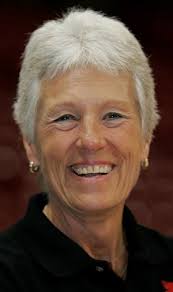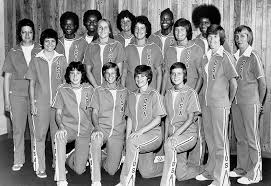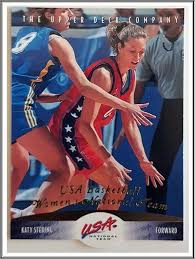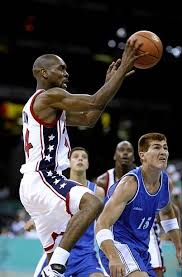The NBA Finals date back to 1947 (when they were known as the Basketball Association of America Finals) and the very 1st NCAA tourney was held in 1939. Olympic basketball competition is even older: it debuted as a demonstration event in 1904 and the men’s version became a medal sport in 1936, with the women finally getting their chance to go for the gold in 1976. The United States has dominated Olympic basketball competition from the start: the men have won 15 gold medals in the 18 tournaments they have participated in during the past 84 years, while the women have won 8 gold medals in the 10 tournaments in which they have competed during the past 44 years. Those of you who were looking forward to the 2020 Olympics opening ceremonies in Tokyo today will have to wait an extra 364 days, as the coronavirus caused a postponement until July 23, 2021. Due to the absence of college basketball since mid-March, HoopsHD’s Jon Teitel decided to fill the void by trying to interview as many prior Olympic players/coaches as possible so that you have something to read this summer while not watching the Summer Games. We continue our coverage by chatting with Jim Washington about his former teammate Walt Bellamy winning a gold medal in 1960 and being named NBA ROY in 1962. Today would have been Walt’s 81st birthday so we are proud to honor his memory.
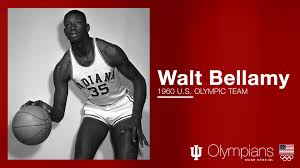

Walt chose to attend Indiana, which at the time was the closest school to the South that would accept African-Americans: what effect did race have on his decision? Walt certainly would have been sensitive to what was going on at the time. He was an introspective person so I am sure that race played a significant role. He was a tremendous talent and I am sure that a lot of schools would have liked to have him.
He played for team USA at the 1960 Olympics: was that the best team he ever played on, and what did it mean to him to win a gold medal? He did not talk about it a whole lot but he did have an opinion on the “Dream Team” of the Michael Jordan era. Walt said that he was on the 1st real “Dream Team” back in 1960 with all of the great future Hall of Famers they had at the time!
In 1961 he scored 28 PTS and had a Big 10-record 33 REB in his final collegiate game vs. Michigan: what was his secret for being a great rebounder? He was the prototype for taller players today. He was not a traditional center: he could face the basket and was much more agile than the big guys of that day. Centers were supposed to rebound back then: just look at the stats of guys like Wilt Chamberlain/Bill Russell. He knew what his role was: to get rebounds.
In the summer of 1961 he was drafted 1st overall by the Chicago Packers: did he see that as a validation of his college career, or the realization of a lifelong dream of reaching the NBA, or other? I was the #1 draft choice of St. Louis in 1965, and while it was nice it did not have as much hoopla as it does now: we would just get a phone call. It did not really matter whether we were drafted in the 1st round or a later round. I remember getting a call from St. Louis, which surprised me because since I played at Villanova I thought that Philly was going to take me with a territorial pick, but the 76ers took Billy Cunningham instead. I am sure Walt was expected to go #1 but the most important thing was just to make the NBA.
In 1962 he was named ROY, scored a career-high 31.6 PPG, averaged 19 RPG, and led the league in shooting with a mark of 51.9 FG%: how was he able to come in and dominate right from the start? His stats were rather impressive for anyone coming into the league at the time, especially compared to today. Most athletes aspire to be as good as they can be but in the early-1960s there were still limitations on how many Black players an NBA team could have. The NBA had the best players in the world and he had the talent to play at that level. Unfortunately the Packers were an obscure franchise that did not get a lot of support so they moved to Baltimore.
He was later a member of 1 of the 1st NBA teams to start 5 African-American players: do you remember this being a big deal at the time, and how proud was he of making history? I am sure that he was aware of the significance of that. When Texas Western won the 1966 NCAA title with an all-Black starting 5 we definitely know how important that was. Those kind of things happened without a lot of fanfare because it was a different time.
During the 1968-69 season he was traded from New York to Detroit, and a scheduling quirk allowed him to play in an NBA-record 88 regular season games: do you recall him being especially exhausted at the end of that year, and do you think that anyone will ever break his record? It was not unusual for starters back then to play 40 MPG: you just stayed out there and did not want to come out. He was a big/strong guy and stamina was never his issue. I think that New York and Detroit both had good teams back then and when you are winning you do not get tired…even though it is a long season.
He only missed 12 games during his 14-year NBA career: how did he manage to avoid any serious injuries and was he just able to play through all of the bumps and bruises that came his way? It was amazing that guys did not get injured more because we did not have the benefits or amenities that the guys have today. Everyone today has specially-made shoes that they only wear a couple of times before getting new ones: we played in canvas shoes with no support! We grew up playing on concrete/dirt courts so we were pretty tough. I remember him missing 1 game against San Francisco after his elbow blew up like a balloon.
In 1993 he was inducted into the Hall of Fame after an 18-year wait: why do you think that it took so long for him to get inducted? I am not a big fan of the process: there does not seem to be a system in place for guys who deserve to get in once they become eligible. Walt should have gone in directly but his eligibility almost ran out. I am still trying to fight to get Lou Hudson (who made 6 straight All-Star games from 1969-1974) inducted.
When people look back on his career, how do you think that he should be remembered the most? I am biased but I think his legacy is as 1 of the greatest centers to ever play the game. The fact that his teams did not win titles is why he does not get the accolades he should get, but he was able to be so productive for so many teams due to his talent.


